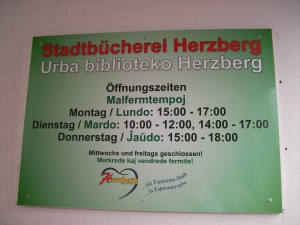More commercial and political influence Posted by Chuck Smith on Dec 15, 2011 in Uncategorized
In my last part about what could happen when more people speak Esperanto, I mentioned that there would be more interesting Esperanto meetings. Now I want to discuss the potential for greater commercial and political influence with more speakers.
More commercial influence
Currently many companies don’t develop Esperanto language courses, because they don’t think there’s enough of a market for them (a notable exception being Transparent Language and more is in the works). If you go into your local bookstore, do you find a book teaching Esperanto? The problem is that many companies judge demand on the current number of speakers instead of on how many people actually want to learn the language.
Also, it can be hard to find typical things like good-quality games or movies in Esperanto. With more speakers, a larger market develops. But, many makers of such products also don’t realize that they can still succeed in a smaller market, because there isn’t as much competition. For example, I personally produce a line of iPhone learning apps called Intense. I sell German and Latin apps (I give the Esperanto app away as a trial version). The funny thing is that even the German market is bigger, I’ve made the same amount of money with the Latin app. The same is true for people making games for Mac OS and Linux. The Mac and Linux markets are smaller, but the selection for consumers in those markets are also more limited, so they are more likely to buy your product.
More political influence
As Esperanto becomes more widespread, it is used more and more in politics. Roland Schnell wrote an entire blog post about Esperanto in German politics (in German). I think the most interesting developments can be seen from the Green, Pirate and Unu Mondo parties. The green party has its own Esperanto association, the Asocio de Verduloj Esperantistaj. There is an Esperanto pirate party website as well as an Esperanto Squad in Berlin. The Unu Mondo party is a purely Esperanto party, which “regards globalization as a chance to realize human rights and abolish poverty everywhere in the world.”
On a local level, there are already huge successes like the Herzberg, the Esperanto city. For years, Peter Zilvar worked with the city until they decided to make it official. Throughout the city, you can find Esperanto monuments as well as bilingual street signs. There is also, of course, an Esperanto center there.
The Future of Esperanto?
Every year (except during the world wars), the Esperanto community grows. As I see it, we’re just getting started. What do you see in the future for Esperanto speakers? What commercial and political opportunities should be explored? Let me know how you see the future of Esperanto in the comments!

Build vocabulary, practice pronunciation, and more with Transparent Language Online. Available anytime, anywhere, on any device.
About the Author: Chuck Smith
I was born in the US, but Esperanto has led me all over the world. I started teaching myself Esperanto on a whim in 2001, not knowing how it would change my life. The timing couldn’t have been better; around that same time I discovered Wikipedia in it’s very early stages and launched the Esperanto version. When I decided to backpack through Europe, I found Esperanto speakers to host me. These connections led me to the Esperanto Youth Organization in Rotterdam, where I worked for a year, using Esperanto as my primary language. Though in recent years I’ve moved on to other endeavors like iOS development, I remain deeply engrained in the Esperanto community, and love keeping you informed of the latest news. The best thing that came from learning Esperanto has been the opportunity to connect with fellow speakers around the globe, so feel free to join in the conversation with a comment! I am now the founder and CTO of the social app Amikumu.





Comments:
johano:
I think the U.N. should adopt or at least look at the global benefits of Esperanto.
WC:
I started learning Esperanto because I think it really can bring people together from different languages and cultures.
But I’ve been disappointed to find that the only things talked about in Esperanto are Esperanto and politics! Whenever I try to find anything else, I find a tiny bit of content and that’s it.
It’s a big hurdle for me, because I don’t like studying, and I don’t like talking about politics. And in general, I’m not comfortable talking to people unless I’m reasonably well-spoken, which is impossible for me in Esperanto yet.
I’ve found a few books (Alice in Wonderland, The Hobbit) but they’re stuff I’ve read in other languages. I need new stuff, generally. Movies, likewise.
As I don’t travel and don’t chat, I’m finding it hard to get motivated to learn Esperanto.
So what do I see as the future of Esperanto? Well, to survive, I think it needs to have people who produce original, AAA content. Books, movies, video games… Things to interest people. Currently English fills this roll internationally, but I could see Esperanto filling it, if it had some content.
Neil:
For Johano: http://www.esperanto-un.org
Tim:
Has Esperanto gained a larger percentage of the total world population or just the total sum in general?
Chuck Smith:
@Tim I’m pretty sure it has gained a larger percentage as well, but that’s my own personal feeling. No one has a census for Esperanto speakers, so it’s hard to judge, I’m afraid.
Manoochehr Danesh:
karaj samideanoj ,
I would like to know how can i listen to Radio Esperanto
on my mobilphone as well as my car radio ? I am living in
Tehran and learning Esperanto by self-study.Thank you.
M. Danesh Memb.of Irana-Esperanto-Asocio.